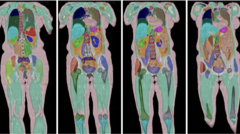Can This New AI Voice Tool Perfectly Mimic British Regional Accents?

A New Era in AI Voice Cloning: Synthesia's Revolutionary Approach to UK Accents
The emergence of advanced AI voice-cloning technology marks a significant milestone in the realm of artificial intelligence. A British firm, Synthesia, has taken a bold step to improve the representation of UK accents in AI-generated voices, which have predominantly been influenced by North American data. With the launch of its product, Express-Voice, Synthesia aims to accurately mimic a wide range of regional accents across the UK, setting a new standard for voice synthesis. This article explores the implications of Synthesia's advancements, the challenges faced in accent representation, and the broader context of voice technology in an increasingly digital world.
The Need for Accurate Regional Representation
Traditional AI voice models have primarily relied on datasets rich in North American and southern English voices, resulting in a homogeneity that fails to capture the diversity of accents present in the UK. As Youssef Alami Mejjati, Head of Research at Synthesia, notes, individuals, whether CEOs or everyday people, desire their accents to be preserved when their likeness is represented digitally. This desire for authenticity extends beyond mere preference; it encompasses cultural identity and personal connection.
To combat the bias in existing AI models, Synthesia has invested a year in compiling a comprehensive database of UK voices featuring regional accents. This initiative involved recording individuals in studios and gathering online audio material, enabling the company to create a product that can clone real voices or generate synthetic alternatives. The result is a tool that speaks to the unique characteristics of various UK accents, addressing a critical gap in the market.
Understanding the Challenges of Accent Mimicry
One of the most significant challenges in voice cloning is the availability of training data. Accents that are less common or have limited recorded material are notably difficult to replicate. Mr. Mejjati highlights that the hardest accents to mimic are often those that lack sufficient representation in existing datasets. This scarcity of quality data can lead to a lack of accuracy and authenticity in AI-generated voices.
- Common Accents: Accents such as Received Pronunciation (RP) and Estuary English are more prevalent in datasets, making them easier to replicate.
- Regional Accents: Accents from areas like Wales, Scotland, or Northern Ireland often suffer from underrepresentation, resulting in less accurate AI portrayals.
- Rare Accents: Some regional dialects may not have sufficient recorded material, rendering them nearly impossible to replicate convincingly.
The implications of these challenges extend beyond entertainment and marketing; they touch on issues of accessibility and communication. Reports have surfaced indicating that voice-prompted AI products, including smart speakers, often struggle to understand a variety of accents. This has raised concerns, particularly in law enforcement, where internal documents from West Midlands Police revealed doubts about the ability of voice recognition systems to comprehend Brummie accents.
The Global Landscape of Accent Recognition
In contrast to Synthesia’s approach, other companies are navigating the complexities of accent representation differently. The US-based startup Sanas, for example, is working on tools designed for call centers that "neutralize" the accents of Indian and Filipino staff members. This approach aims to combat "accent discrimination," a phenomenon where callers may struggle to understand employees due to their accents. While this technology seeks to address misunderstandings, it raises questions about the implications for cultural identity and authenticity in communication.
The Homogenization of Language
The rise of AI voice models has led to concerns about the homogenization of language and the potential loss of linguistic diversity. According to UNESCO, nearly half of the over 7,000 languages that exist today are endangered, and many dialects are at risk of disappearing in the digital era. With only a small fraction of languages supported by translation tools like Google Translate and AI models like OpenAI's GPT-4, the digital landscape often favors more widely spoken languages, further marginalizing regional dialects.
Language models, as AI expert Henry Ajder points out, are contributing to the homogenization of speech. The algorithms underlying these models often prioritize data from more populous regions, leading to a reduced representation of minority languages and accents. This trend raises ethical considerations about the future of communication and cultural preservation in an age of rapid technological advancement.
Security Concerns in Voice Cloning Technology
While the advancements in voice cloning technology present exciting opportunities, they also pose significant security risks. The accessibility of free, open-source voice-cloning tools has raised alarms regarding potential misuse. With the rapid evolution of this technology, the ability for malicious actors to impersonate individuals using cloned voices has become a pressing concern.
Recently, there have been reports of AI-generated messages impersonating US Secretary of State Marco Rubio being sent to ministers, highlighting the risks associated with easily accessible voice-cloning tools. Mr. Ajder notes that the speed of development in the open-source landscape has created safety concerns, particularly as the technology becomes more sophisticated.
Protective Measures and Future Outlook
Synthesia recognizes the potential for misuse and has announced that its product, Express-Voice, will not be free upon release. The company is implementing guardrails to prevent hate speech and the generation of explicit material, aiming to create a responsible framework for the use of its technology. However, the presence of unregulated open-source tools continues to pose challenges in establishing a secure environment for voice cloning.
As the demand for personalized AI-generated voices continues to grow, the balance between innovation and security will be critical. Companies operating in this space must remain vigilant, adopting ethical practices that safeguard against potential misuse while promoting the responsible development of voice technology.
Conclusion: The Future of Voice Technology and Accent Diversity
The advancements made by Synthesia in the realm of AI voice cloning represent a significant step forward in accurately representing regional accents. By addressing the limitations of traditional datasets, the company is paving the way for more authentic and diverse voice synthesis. However, the challenges of accent representation, language preservation, and security must be navigated carefully as the technology evolves.
The conversation surrounding AI voice cloning transcends mere technological advancement; it encompasses themes of identity, culture, and the ethical implications of our digital future. As we continue to explore the capabilities of AI, it is crucial to consider the impact on linguistic diversity and the preservation of our rich tapestry of languages and accents.
As we move forward, how will we ensure that technological advancements in voice cloning support rather than diminish the diversity of human expression? The journey of voice technology is just beginning, and its trajectory will undoubtedly shape the way we communicate in the years to come.
FAQs
What is Synthesia's Express-Voice technology?
Synthesia's Express-Voice is an AI voice-cloning tool designed to accurately replicate a wide range of UK accents. It uses a comprehensive database of regional voices to create synthetic voices or clone real ones for applications like training videos and presentations.
Why are some accents harder to replicate than others?
Accents that are less common or have limited recorded material are more challenging for AI models to mimic. The availability of quality training data significantly affects the accuracy of voice synthesis.
What are the ethical concerns surrounding voice cloning technology?
With the rise of accessible voice-cloning tools, there are concerns about potential misuse, including impersonation and the spread of misinformation. It is essential for companies to implement protective measures to safeguard against these risks.
As we stand on the brink of a new era in voice technology, how can we best balance innovation with the preservation of our unique cultural identities? #VoiceCloning #AccentDiversity #AIInnovation
Published: 2025-07-14 23:08:06 | Category: technology



